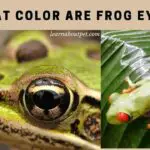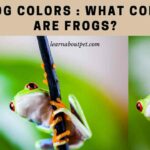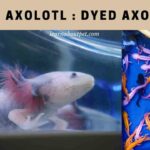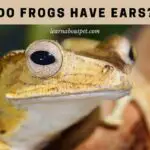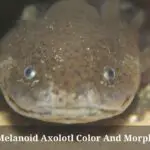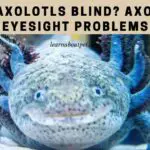The eyes are among the most fascinating external organs in axolotls. People often express interest in knowing how the axolotl’s eyes work, how good axolotl vision is, what colors axolotls’ eyes come in and so on. In this article, you will find answers to most of the frequently asked questions about axolotls’ eyes.
Axolotl eyes mainly serve the purpose of helping the axolotls to see. But the vision is poor, and axolotls rely more on their lateral line organs as well as their sense of smell to survive. The eyes in axolotls can range in color from blue to white, red and black.
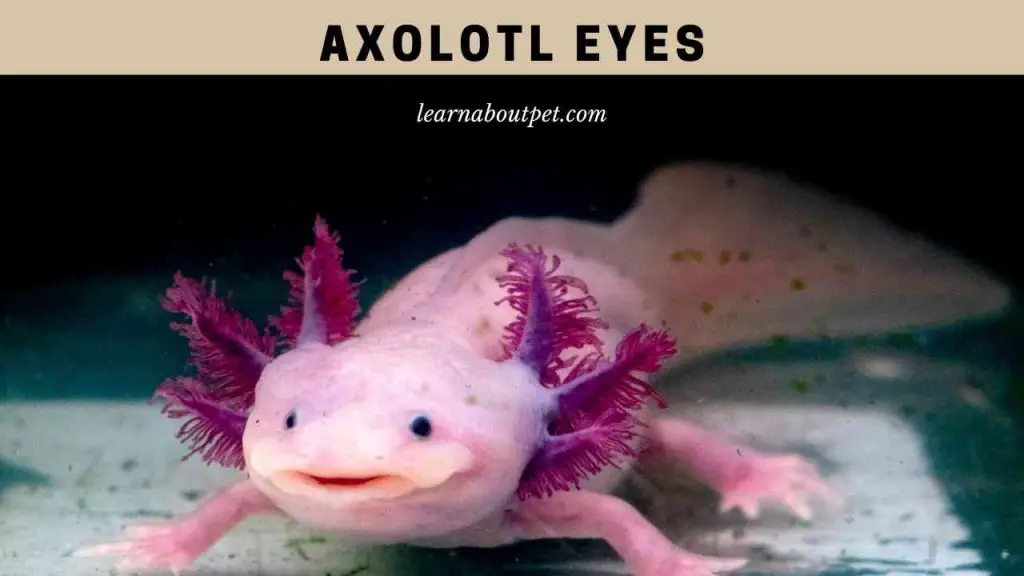
Do All Axolotls Have Eyes?
Not all axolotls have eyes. This means that it is possible to encounter an axolotl without eyes.
Where you find such an eyeless axolotl, it is likely to be due to genetic problems. This is where optical vesicles fail to form, due to a certain recessive gene.
The culpable gene here seems to be the one that we refer to as ‘recessive gene e’. So it is the expression of this particular gene that ultimately leads to there being some eyeless axolotls.
Nonetheless, the eyeless axolotls are quite rare. Most axolotls have eyes. And that is why, in most cases, the answer to the do axolotls have eyes question is ‘yes’.
An axolotl without eyes is the exception, rather than the rule.
How Good Is Axolotl Eyesight?
Axolotl eyes don’t really see very well. Therefore at best axolotl eyesight can be described as ‘poor’. True, the axolotl lens is able to focus light. And the axolotl retina is able to receive the light. But the eyesight is still rather poor.
Ultimately, we find that an axolotl doesn’t really rely much on its eyesight to survive. Rather, through its lateral line organs, it is able to sense even the minutest movements and pressure changes in the water that it is in.
Further, through its sense of smell, it is able to find food. Once it smells food, and detects the location of the food using its lateral line organ, it can then proceed to ‘snap’ at the food item in question, then swallow it in due course.
Ultimately, in an axolotl eyes play a minor role. That is why we even have eyeless axolotls that are nonetheless able to survive.
What Color Eyes Can Axolotls Have?
Axolotls eyes come in different colors. Axolotl red eyes are common, as are axolotl blue eyes.
White is another color in which axolotl eyes often come. Therefore axolotl white eyes are common.
Sometimes, we find axolotls with black eyes. Thus, for instance, you may find a golden axolotl with black eyes. Or you may even find a white axolotl with black eyes.
Therefore there is great variation in axolotl eye color.
Some eye colors may however be almost impossible to find. For instance, if you try looking for an axolotl with green eyes, (genuine green eyes) it may prove hard to find.
But then again, the axolotl’s main body color can create the illusion of a different eye color. For instance, you may be thinking that what you are looking at is a black axolotl with green eyes.
But when you examine the axolotl eye close up, you find that it is actually blue. Yet because it is set against a black background, you misperceive it as green.
Similar illusions may make you think that you are looking at an axolotl with pink eyes or an axolotl with gold eyes.
But the colors that axolotl eyes usually come in include red, white, black and blue.
Why Do Axolotls Have Small Eyes?
One of the most frequently asked questions about axolotl eyes is as to why they are so small.
One theory is that axolotls have small eyes because they mostly live in water, whether the smell and lateral line organs are more important senses than eyesight.
So because the axolotl doesn’t have much need for the eyes, they have evolved to be small.
You also have to remember that axolotl’s eyes are lidless. If they were to be very big, they would be very uncomfortable to have (as they would be letting in too much light, to which the axolotl is sensitive).
Therefore having small eyes serves the axolotl well.

Can An Axolotl Regenerate Its Eyes?
One of the most intriguing things about axolotls is their ability to regenerate their various organs. In fact, it is due to this regenerative ability that the axolotls have become so popular within the scientific research communities.
Now one of the questions that often come up, with regard to axolotls, is as to whether they are able to regenerate their eyes.
And amazingly, the answer is yes. If, for instance, an axolotl loses its eyes – including the inner parts like the iris and lens – it is able to regenerate the same.
There are even scientists who say that it is possible to graft eyes into the heads of the eyeless axolotls. And with time, those eyes start functioning well!
Therefore the true position is that an axolotl can regenerate its eyes.
Axolotl Bulging Eyes – What Do They Mean?
If your axolotl has bulging eyes, it may be an indication that it is living under poor water conditions.
For instance, if the nitrate levels in the tank are consistently too high, you may end up with some degree of exophthalmia in the axolotl.
In the worst case scenario, the bulging eyes in an axolotl may be an indication that the axolotl is starting to morph, on account of being in poor water conditions.
Therefore bulging eyes in an axolotl need to be taken seriously.
Axolotl Cloudy Eyes – What Do They Mean?
If you find axolotl eyes cloudy, it may be an indication of sickness. So the axolotl may be ill, with the illness manifesting through the cloudy eyes.
Axolotl cloudy eyes may also be due to stress. The stress that is as a result of being in poor water conditions can, for instance, manifest through cloudy eyes.
Thus if you find your axolotl’s eyes cloudy, those are the possibilities to consider.
How Can You Protect Your Axolotls Eyes?
One key thing you need to do is provide the axolotl with hides. This way, when there is intense light (to which the axolotl’s eyes are sensitive), then it can hide there.
Remember, the axolotl doesn’t have eyelids that it can shut when assaulted with intense light.
You should of course also provide the axolotl with a proper diet.
In case you notice any unusual eye-related symptoms (bulging eyes, cloudy eyes and so on), you need to investigate them. Then take the necessary corrective actions in good time.
You need to understand that whereas the eyes in axolotl’s are not the primary sense for survival, they do still serve some purpose.
At the very least, through the eyes, you can tell about the state of your axolotl’s overall health. So the eyes have some importance.
Final Verdict – Axolotl Eyes
Most axolotls have eyes. There are a few eyeless axolotls, and that is usually due to the action of the recessive gene e.
The eyesight in axolotls is rather poor. For their day to day survival, axolotls depend more on their lateral line organs and their sense of smell. But their sense of sight, though poor, has its importance as well.
In case you find unusual eye-related issues in an axolotl – for instance bulging eyes or cloudy eyes – you need to take them seriously.

They may be indications that the axolotl is very ill or that you are keeping the axolotl in very poor water conditions.
Because axolotls’ eyes have no eyelids, and yet the axolotls are very sensitive to intense light, it is important to provide them with cave-like structures (hides) into which they can be hiding whenever there is intense light.
As a pet lover, make sure to learn about pet more and give your pet axolotl a good and comfortable life!

Welcome to Learn About Pet. My name is Rajkumar Ravichandran and I love all pets, travel, and amazing food. I write about my passion and personal experience caring for multiple pets in this blog! ❤️
Post Disclaimer
DISCLAIMER: THIS BLOG OR WEBSITE, "Learn About Pet", DOES NOT PROVIDE YOU WITH MEDICAL ADVICE AND IS NOT A SUBSTITUTE FOR MEDICAL ADVICE. ALWAYS GET IN TOUCH WITH YOUR PERSONAL VETERINARIAN AND USE INFORMATION HERE AS GENERAL ADVICE.
The information, including but not limited to, text, graphics, images and other material contained on this website are for informational purposes only. No material on this site is intended to be a substitute for professional veterinary advice, food recommendation, diagnosis, or treatment. Always seek the advice of your veterinarian or other qualified health care provider with any questions you may have regarding a medical condition or for pet food related questions.
